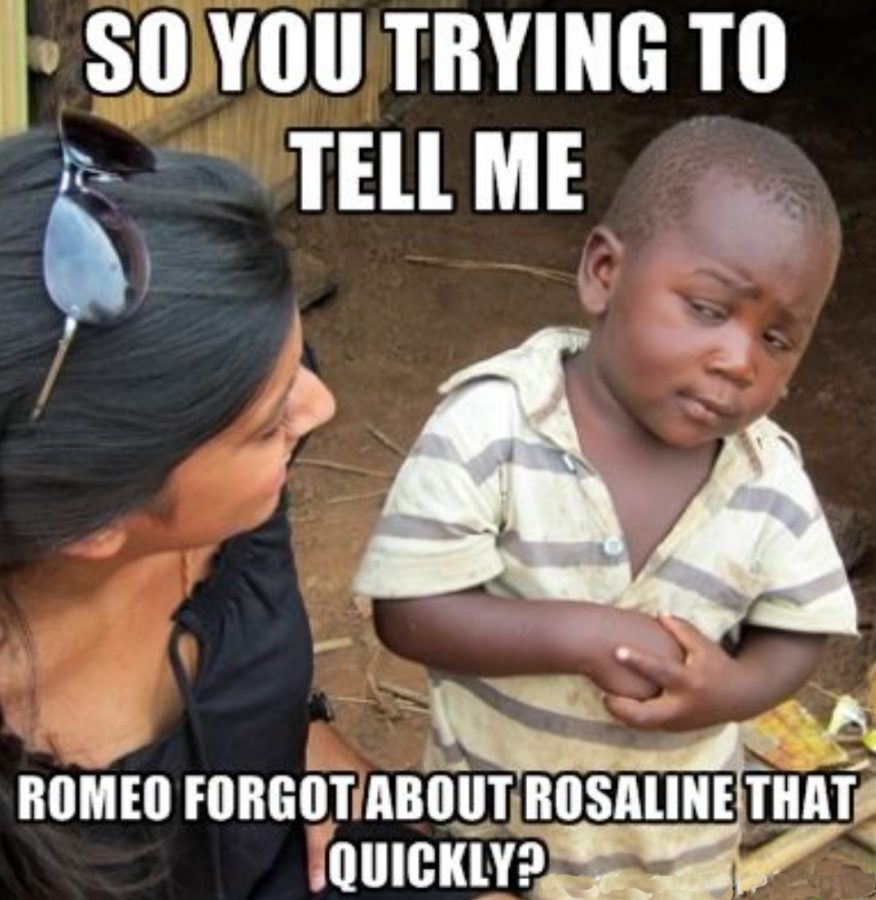
You Can’t Outrun a Foregone Conclusion
Keith Hamilton Cobb
I was playing Capulet in a production of Romeo and Juliet at a theater that shall remain nameless. They do tend to be, after all, so many nameless, faceless parts in a giant piece of manufacturing machinery. We remember them for some long ago gotten reputation, or perhaps a particular artistic director, “Isn’t that the place that Joe Schmoe used to run for, like the last seventy nine years?” Or just as often, “That was the place that did that production of Three Sisters with an all-male cast, but only because that TV show guy played Masha, and he had just come out as gender fluid in Vanity Fair…” They all do their bit but none of it is ever really any more remarkable than any other of it most of the time. I wonder often about the relevance of the product, who it serves, who consumes it, and why. I muse upon the idea of the mediocritizing even of innovation…
Anyway, we were in rehearsal, and something that I was working on must have been testing the director’s patience because he said that I needed to do it faster. “Act on the line,” he told me. “You don’t want the audience to get ahead of you.”
I might add here that the director was young, at least in comparison to me, though still well out of grad school if he had attended one, and “louder, faster, funnier” is the type of comment that will come from out of the mouth of one of only two possible types of directors, either the ill-trained type, or the terrified type. He had handed us a script of the play upon first rehearsal so full of orphans (those are lines in a script that erroneously remain pertaining to something else that has been excised in the editing process) that I had had a truly difficult time convincing myself that he knew what he was reading when he first took his knife to it.
That’s not to say I have an issue with cutting Shakespeare. God, no! Cut away! Just don’t make your primary motivation the need to keep your audience from falling asleep. If it is, you’re fucked already. And, if you go that route, that is the route of editing severely, you have to know what you’re reading way before you can discern what doesn’t need to be there, and not in any general sense either. That general sense is what your audience already knows just as well as you. Your understanding of the received text must far surpass theirs because it is you who is going to be responsible that they hear it and comprehend fully what they hear. I have no qualms regarding taking the air out of acted Shakespeare either, in fact, I’m all for it. But, given the messy text I’d been handed, the director’s admonition to “act faster” suggested to me that he might very possibly have been one of those in the cut-the-play-because-it’s-way-too-long camp, a hybrid of the ill-trained and the terrified, and that, slow or fast, he would have had very little discernment regarding what I was actually saying or why I was saying it in the way that I was.
The upshot is that whether he had been bold and creatively ballsy enough to attempt the play uncut, or prepared to dumb it down to a digestible hour with intermission, the audience would have started, remained, and finished ahead of him. Alright, perhaps not the three patrons who might have shown up over the entire run of his production who didn’t know the story of Romeo and Juliet. But for everyone else, they were ahead of him before they got out of their cars, before they got in their cars, before they bought their tickets. They were ahead of him by the time they finished freshman year of high school. The play has had a four hundred-year head start. Everybody knows where it ends and why it ends there. So if your production of one the most well-know plays in the Poet’s canon and all of Western literature is nothing more than a race to the finish with your audience, nor I nor any man that but man is would be stupid enough to bet on you. You’ll lose. When we process Shakespeare through our manufacturing machinery expecting it to spit out a product of any note at all that we can put on a stage simply because it’s Shakespeare, we always lose.
Regardless, the machinery will never be stilled, except perhaps by pandemic. That and an unfathomable array of television choices at the touch of a button. But it will run as long as it turns a dividend, and it will run because it turns a dividend and not because there is something yet to be mined in Romeo and Juliet that might inspire the world. There is, but to find it is way too difficult and never cost effective.
The purists and other anointed adepts will tell you “It’s all in the text. Just say it…correctly, mind you,” as if they knew what “correct” was. But their hope, their erroneous trust, is that Shakespeare’s genius lightning will strike twice, that it will strike every one of the millions of times that the play is done even eons removed from anything it ever once meant, that the text will remain unimpeachably sublime forever. They will say that if the text doesn’t resonate you’re not saying it right. And the hacks who leave orphans all over the scripts they’ve cut will say, if they even care, that if it doesn’t resonate it’s because you’re saying it too slowly and it needs to be made shorter. But here is the truth: To find the extraordinary in the plays now, today, is grueling work, and it will require a far deeper desire and intention than the theater industry has instilled in its privileged enablers. Everything else is the same old, old, no longer inspiring story retold.
Now, I can’t pretend that sometimes this isn’t alright. Like children at bedtime exhorting a parent to read the story again, and again, sometimes the appetite to just wallow in the comfort of hearing the tale told outweighs anything that the tale actually imparts. Mindless television and pulp novels are all forms of the same thing, creating revenue streams by feeding the needs of large audiences for not-too-challenging story while not over-spending. And we are back to the recycled sad story of Juliet and her Romeo. But then there are the narratives like Othello, another story of star-crossed lovers. However this one rests upon a set of assumptions regarding race and the characteristics attributed by the author to Blackness, and suddenly the play in perpetuity is not merely a comforting old yarn, but a continual reaffirmation of toxic ideas that contemporary audiences seek assurances in. And again, as I begin to tell the tale, they are way ahead of me.
Othello, the hero, whom much of the writing to follow will be about, loses all control of his reason because someone in whom he has placed a deep trust insinuates to him a few things. If there are reasons to trust a subordinate so deeply that if he tells you without a shred of evidence that your wife is fucking your first officer you believe him, I must find them, and make them part of the story. If I do not find them, the hero appears to be an unconscionable Black asshole, and it is not for a contemporary theater maker of any integrity or awareness of what is socially just to let that ancient and ill-conceived impression stand. Othello is impassioned by how the things whispered into his ear bounce around in his brain and set ego at blows with rationality. Then he murders his wife in a manner dressed up like an honor killing, and that’s a part that happens all the time. I imagine it has happened at least a hundred times in America just today. It happens anywhere men in power hate women, and we, as a culture, hate women here, let’s stop lying and face it. The remainder of the play, Othello’s saying and doing, his cumulative being as it most plainly exists upon the page, I’m not at all sure about. It is far too easy to let him charge head-long into infamy like a dumb beast with a perceived danger at his heels, then have his causal psychology retrofitted by some culturally ordained white literary critic later on.
Again, I feel integrity-bound to mitigate all of the Othello assumptions, but regardless everyone knows how, and where, this story goes. There is no not letting the audience get ahead of us in the inevitable march toward the tragic conclusion. All that I can do is to offer—and I will just as facilely, just as readily force-feed—my contemporary American audience the opportunity to gain a few brand new awarenesses along the road. Like, for instance, white men in power in America is a thing that’s about to disappear, and that fact scares the shit out of them, and the more frightened they become, the more unabashedly and viciously they lash out at anything and everything that is not like them. Along with hating women, they seek to quell all difference that seeks for itself what they have always had, including rudimentary happiness.
The rabid hatred of frightened white manhood has driven the producing and playing of Othello for four hundred years. It also permeates the play. So yes, consider that Othello may, in fact, run terrified from his demons into infamy…but consider as well that so do all who have been complicit in perpetuating the myth of the dangerous, ignorant, criminal black man. It might have been nominally about something else on Shakespeare’s watch, though I doubt it. Now, it is about hatred and fear. The play seethes with it, both within and in the unevolved and perpetual playing.
There should be a difference between accepting a story as a story and believing in fact that the events could actually happen. We can sit and enjoy hearing the retold tale of Cinderella by a talented teller, but we don’t believe for a moment that a Fairy Godmother actually made a coach and horses out of mice and a pumpkin. We can hear how an impassioned man murders his wife because it is dramatic, perhaps even titillating, like slasher porn, and we can believe it because we know such things occur. But we don’t believe the story itself if the story points are too pat to have brought about the bloody climax any more than we believe in Fairy Godmothers. We don’t believe it any more than we believe that pedophiles and cannibals from Hollywood are holding the government hostage…unless, of course, it serves or imperils some perceived imperative end of ours that we do—unless we have an Iago whispering our worst fears into our ears and we are rendered utterly irrational by our belief in every iota of his bullshit.
I could wish that it were the talent of the teller that makes us listen closely to this tale that we might otherwise have long since grown wholly bored with. But for Othello and other fantastical fictions, however, it seems the teller’s task has been made all the easier by the need of the listener to hear the story told, and to take comfort in what the tale imparts—even if it is a reaffirming of the listener’s fears. If it is the emphases inherent in the telling that draw our focus and shape the narrative, then only a telling that shifts the emphases can reimagine Othello as a story that is not meant to bring us a macabre comfort. There is a way to drive toward the end of an age-old story that everyone knows, even while the listeners have all taken a peculiar comfort in its tragic conclusion. There is a way to have them, rather than simply complacently watching the approach of the inevitable, wish that the ends could be avoided—or even triumphed over. In the least case, there is a way to leave them astounded that the story did not unfold the way they knew it would, and cast into deep question their foregone conclusion.
Of course such feats require a greater contribution from every individual involved in every aspect of the creative process. I’m sure I’ll be harping on what those greater contributions are and all those whom they are incumbent upon in future posts. Irrespective of all, we will never outrun the foregone conclusions of Shakespeare’s Othello. Intentional or not in the writing, they have been ossified by agenda over 400 years. For me, this is often reason enough to leave his fuckin’ play alone. If we must recycle Shakespeare ad nauseam for no other reason but because it is Shakespeare—or in the case of Othello because it reaffirms white fears and perversely justifies white self-serving perceptions—we can also, if we choose, because we are wild, compassionate creatives responsible only to beauty and truth and not cowards masquerading as heroes, show vividly some of these forgone conclusions to be worthy of nothing but our unending interrogation and doubt. If we choose not, the most frighteningly foregone of all foregone conclusions remains mediocrity and us.


